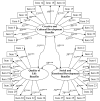Beliefs and Values About Music in Early Childhood Education and Care: Perspectives From Practitioners
- PMID: 31105608
- PMCID: PMC6492529
- DOI: 10.3389/fpsyg.2019.00724
Beliefs and Values About Music in Early Childhood Education and Care: Perspectives From Practitioners
Abstract
This paper reports the findings of a study that aimed to identify the music beliefs and values of educators in early childhood education and care settings in Australia. The aims of the study were 2-fold: to adapt and pilot a survey of music beliefs and values which might be implemented subsequently nationally in childcare settings; and, secondly, to identify the music beliefs and values held by early childhood and care educators concerning music in children's learning. The research questions that guided this component of the study were: What is the profile of early childhood and care educators? What beliefs and values for music engagement are held by early childhood and care educators? What shapes early childhood and care educators' music beliefs and values? Findings indicated that educators' beliefs and values on all items are above the mid-point indicating overall positive attitudes toward music despite the majority having no formal qualifications in music or a history of instrumental performance and/or singing. Given the overall positive attitudes toward music we suggest there is enormous potential within this population for further professional learning and development targeted at music and its potential wider benefits in young children's learning and lives.
Keywords: early childhood education and care; early childhood educators; music beliefs and value; music education; music practices in early childhood education and care.
Figures
Similar articles
-
Outdoor Time, Space, and Restrictions Imposed on Children's Play in Australian Early Childhood Education and Care Settings during the COVID Pandemic: A Cross-Sectional Survey from Educators' Perspective.Int J Environ Res Public Health. 2023 Sep 18;20(18):6779. doi: 10.3390/ijerph20186779. Int J Environ Res Public Health. 2023. PMID: 37754638 Free PMC article.
-
Early childhood educators' knowledge about language and literacy: Associations with practice and children's learning.Dyslexia. 2020 May;26(2):137-152. doi: 10.1002/dys.1612. Epub 2019 Mar 4. Dyslexia. 2020. PMID: 30834644
-
Association between childcare educators' practices and preschoolers' physical activity and dietary intake: a cross-sectional analysis.BMJ Open. 2017 May 30;7(5):e013657. doi: 10.1136/bmjopen-2016-013657. BMJ Open. 2017. PMID: 28559455 Free PMC article.
-
"It's Embedded in What We Do for Every Child": A Qualitative Exploration of Early Childhood Educators' Perspectives on Supporting Children's Social and Emotional Learning.Int J Environ Res Public Health. 2021 Feb 5;18(4):1530. doi: 10.3390/ijerph18041530. Int J Environ Res Public Health. 2021. PMID: 33562768 Free PMC article.
-
Neurological and developmental approaches to poor pitch perception and production.Ann N Y Acad Sci. 2015 Mar;1337(1):263-71. doi: 10.1111/nyas.12623. Ann N Y Acad Sci. 2015. PMID: 25773643 Free PMC article. Review.
Cited by
-
Perspectives of teachers at music schools toward children's extra-musical abilities promoted by music lessons.Front Psychol. 2023 Jul 10;14:1190731. doi: 10.3389/fpsyg.2023.1190731. eCollection 2023. Front Psychol. 2023. PMID: 37492443 Free PMC article.
-
Chinese Pre-service Music Teachers' Perceptions of Augmented Reality-Assisted Musical Instrument Learning.Front Psychol. 2021 Feb 4;12:609028. doi: 10.3389/fpsyg.2021.609028. eCollection 2021. Front Psychol. 2021. PMID: 33613388 Free PMC article.
-
The transformative power of music: Insights into neuroplasticity, health, and disease.Brain Behav Immun Health. 2023 Dec 12;35:100716. doi: 10.1016/j.bbih.2023.100716. eCollection 2024 Feb. Brain Behav Immun Health. 2023. PMID: 38178844 Free PMC article. Review.
-
Singing and Social Identity in Young Children.Front Psychol. 2022 Jun 2;13:823229. doi: 10.3389/fpsyg.2022.823229. eCollection 2022. Front Psychol. 2022. PMID: 35719461 Free PMC article.
-
Rhythm and Movement for Self-Regulation (RAMSR) intervention for preschool self-regulation development in disadvantaged communities: a clustered randomised controlled trial study protocol.BMJ Open. 2020 Sep 13;10(9):e036392. doi: 10.1136/bmjopen-2019-036392. BMJ Open. 2020. PMID: 32928851 Free PMC article.
References
-
- Austin J. R., Reinhardt D. (1999). Philosophy and advocacy: an examination of preservice music teachers' beliefs. J. Res. Music Educ. 47, 18–30.
-
- Australian Children's Education and Care Quality Authority (ACECQA) (2016). NQF Snapshot Q2 2016. Sydney, NSW: ACECQA.
-
- Ballantyne J. (2006). Reconceptualising preservice teacher education courses for music teachers: the importance of pedagogical content knowledge and skills and professional knowledge and skills. Res. Stud. Music Educ. 26, 37–50. 10.1177/1321103X060260010101 - DOI
-
- Ballantyne J., Packer J. (2004). Effectiveness of preservice music teacher education programs: perceptions of early-career music teachers. Music Educ. Res. 6, 299–312. 10.1080/1461380042000281749 - DOI
LinkOut - more resources
Full Text Sources


